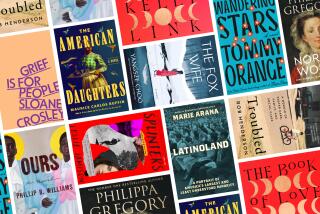The cozy storytelling of Maeve Binchy
- Share via
No writer wants to be called “cozy,” right? Satirical, mordant, horrifying, bold, funny – anything but that word.
Yet coziness is what Maeve Binchy delivered in 16 novels and numerous story collections before her death this week at the age of 72.
The author’s death at a Dublin hospital was announced Monday in the Irish media.
Fans like Nicole Cliffe, at The Hairpin, mourned the death of Binchy, calling her the creator of “funny, sweet, intermittently tragic and extremely enjoyable novels” that reached out to readers around the world and managed to sell more than 40 million copies.
Binchy reigned in the supermarket newsstand aisle with charming tales steeped in melodrama — take, for example, the “traded lives” theme of “Tara Road” (an Oprah Book Club choice) or the secret identity twist in “The Glass Lake” (the climax of that one left this blogger’s mom positively breathless — she couldn’t stop raving about it).
Her publishers have billed her books as “romances,” but Binchy’s fans have used a different word to describe them: “Dickensian.”
Born in 1940 in Dalkey in County Dublin, Binchy was a journalist and teacher by trade before publishing her first novel, “Light a Penny Candle,” in 1982. The “coziness factor” of Binchy’s novels involves the taste she gives us of Ireland’s rural and urban identities. There’s a small, village-like mood to the worlds she creates — much like what a visitor to Dublin feels on every street corner.
The other distinctive feature of her stories are the large, rich casts of fascinating characters (that may be why you hear the word “Dickensian” used so often), like poor country girl Benny Hogan in “Circle of Friends” and struggling Cathy Scarlet in “Scarlet Feather.”
“We have lost a national treasure,” said Irish Prime Minister Enda Kenny of Binchy.
The news of Binchy’s death was joined, a day later, by news of Gore Vidal’s, who died at 86. It was Irish novelist John Banville who decided to draw a comparison between the two in a tribute to Binchy in the Irish Times, where he and Binchy had been colleagues.
“She wrote well, and she wrote generously,” he said of Binchy, who reviewed books for Banville when he was the books editor at the Irish Times. “She could find something to praise in even the duffest of the books I sent her. Gore Vidal used to say that it was not enough for him to succeed, but others must fail. Maeve wanted everyone to be a success.”
ALSO:
Sexperts turned off by “50 Shades of Grey”
“50 Shades of Grey”: Where did the early online drafts go?
“50 Shades of Grey” series to hit 20 million sales mark
More to Read
Sign up for our Book Club newsletter
Get the latest news, events and more from the Los Angeles Times Book Club, and help us get L.A. reading and talking.
You may occasionally receive promotional content from the Los Angeles Times.








